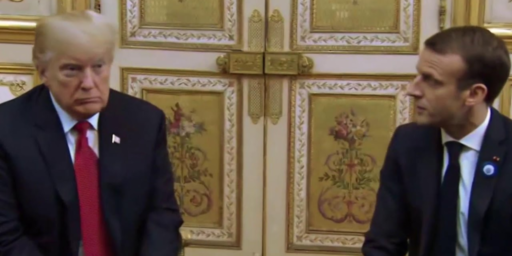Macron Scores Decisive Win Over Le Pen In French Presidential Election
Centrist candidate Emmanuelle Macron scored a decisive win over the far-right Marine Le Pen in today's runoff round of the French Presidential election.
As polls had been predicting largely since the first round of the French Presidential election two weeks ago, centrist Emmanuelle Macron has decisively defeated Marine LePen, leader of the far-right National Front:
PARIS — France on Sunday shrugged off the siren call of right-wing populism that enchanted voters in the United States and United Kingdom, rejecting anti-E.U. firebrand Marine Le Pen and choosing as its next president Emmanuel Macron, a centrist political neophyte who has pledged to revive both his struggling country and the flailing continent.
The result brought to a close a tumultuous and polarized campaign that defied prediction at nearly every turn, though not at the end. Pre-election polls had forecast a sizable Macron victory, and he appeared to have delivered, with projections issued after polls closed showing him with around 65 percent of the vote.
In a speech to the nation, Macron said the country had ”turned a new page in our long history. I want it to be a page of renewed hope and trust.”
The president-elect also reached out to Le Pen voters, saying he could understand their anger, while vowing to defend both France and Europe. ”This is our civilization that’s at stake, our way of life,” he said.
Macron was expected to speak again later Sunday night in the grand courtyard of Paris’s Louvre Museum, where news of his win spawned raucous cheers among thousands of flag-waving Macron backers.
“I feel relieved,” said Valentin Coutouly, a 23-year-old student who described himself as ”European to the core” and who was celebrating on a chilly May night. ”I think we were all afraid that Le Pen could actually win. We realized in the end that it was possible.”
At her own gathering at a Paris restaurant, a downcast Le Pen conceded defeat, telling her demoralized supporters that the country had ”chosen continuity” and said the election had drawn clear lines between ”the patriots and the globalists.”
The outcome — the latest blow in 2017 for far-right movements that had seemed to be on the march last year — will soothe Europe’s anxious political establishment. Across the continent, mainstream politicians had feared that a Le Pen victory would throw in reverse decades of efforts to forge continental integration.
But the outcome instantly puts pressure on Macron to deliver on promises made to an unhappy French electorate, including reform of two institutions notoriously resistant to change: the European Union and the French bureaucracy.
At 39, the trim, blue-eyed and square-jawed Macron will become France’s youngest leader since Napoleon when he is inaugurated this weekend, and his election caps an astonishing rise.
With a background in investment banking and a turn as economy minister under a historically unpopular president, he may have seemed an ill fit for the anti-establishment anger coursing through Western politics.
But by bucking France’s traditional parties and launching his own movement – En Marche, or Onward — Macron managed to cast himself as the outsider the country needs. And by unapologetically embracing the European Union, immigration and the multicultural tableau of modern France, he positioned himself as the optimistic and progressive antidote to the dark and reactionary vision of Le Pen’s National Front.
(…)
No matter whom French voters picked, the choice was bound to be historic.
The dominant two parties of France’s Fifth Republic were both eliminated in the first round. The center-left Socialists were decimated, brought low by the failure of current President Francois Hollandeto turn around the economy or to prevent a succession of mass-casualty terrorist attacks.
The center-right Republicans, meanwhile, missed what was once seen as a sure-fire bet at returning to power after their candidate, former prime minister Francois Fillon, was hobbled by a series of corruption allegations.
The two candidates who remained, Le Pen and Macron, both traced an outsider’s path as they sought residence at the Élysée Palace.
Of the two, Macron had the more direct route. But his campaign still had to overcome all the usual challenges of a start-up, plus some extraordinary ones — including the publication online Friday night of thousands of hacked campaign documents in a cyber-attack that aroused suspicions of Russian meddling.
The outcome of Sunday’s vote will have profound implications not only for France’s 67 million citizens, but also for the future of Europe and for the political trajectory across the Western world.
After a pair of dramatic triumphs for the populist right in 2016 – with Brexit in the U.K., and Donald Trump in the U.S. – France’s vote was viewed as a test of whether the political mainstream could beat back a rising tide.
Many of Europe’s mainstream leaders — both center-right and center-left – lined up to cheer Macron on after he punched his ticket to the second round in a vote last month. The endorsements were a break from protocol for presidents and prime ministers who normally stay out of each other’s domestic elections.
But they reflected the gravity of the choice that France faced. A victory by Le Pen was seen as a possible market-rattling death blow to decades of efforts to draw Europe more closely together, with the country’s new president expected to lead campaigns to take the country out of both the E.U. and the euro
Final numbers won’t be available until later tonight or tomorrow, but it appears that Macron actually slightly out-performed the final polls that showed him getting roughly 61% of the vote with Le Pen garnering around 39% support. Instead, current returns seem to show that Macron will end up with roughly 65% of the vote to Le Pen’s 35%. While this is substantially better than Le Pen’s father did in the 2002 election when he ran in a runoff against Jacques Chirac in 2002, it is still fairly decisive repudiation of Le Pen and her far-right agenda on the part of French voters. Going into this election, of course, there was plenty of concern over whether or not the populist wave that appeared to be hitting the world as evidenced by such things as the Brexit vote in the United Kingdom last year and the election of Donald Trump last November was going to give rise to similar sentiment and outcomes in other parts of Europe in 2017, with the possibility of Le Pen actually winning the election or simply making a better showing in the polls than she apparently has been the primary concern coming out of France. Instead, what we’ve seen on the continent has largely been a repudiation of the far-right, anti-Europe policies that people like Le Pen represent. In national elections in March in The Netherlands, for example, Dutch voters handed a defeat to Geert Wilders and his far-right party’s bid to strengthen their party’s position in Dutch politics. The same thing happened in Austria, where the far-right party failed in its bid to capture the nation’s Presidency despite some initial polling that seemed to show them as being favored. Great Britain’s General Election in June will largely be a contest between the center-right Tories and center-left Labour, while anti-Europe parties such as UKIP poised to once again go down to defeat and become even less relevant going forward. In Germany, meanwhile, which will conduct its Federal Elections in September, the strongest parties in the race consist of Chancellor Angela Merkel and her coalition of center-right parties and the center-left Social Democrats, with the German equivalent of parties similar to Le Pen’s in Germany largely looking in from far outside the mainstream of German politics and unlikely to be a factor in the election.
One thing all of this means, of course, is that notwithstanding the impending exit of the United Kingdom from the European Union thanks to the results of last year’s Brexit vote, the immediate threat to the E.U. is largely behind it. Had Le Pen won and managed to follow that up with a win in legislative elections in June, it likely would have meant at least a push for a French exit from the European Union, a move that could have been a potentially fatal blow to the organization since it likely would have set off similar moves all over Europe. Instead, we have a situation in the coming year where British voters will essentially be affirming the results of the Brexit vote no matter which of the two major parties wins while, in Germany, both of the contenders for power continue to support a strong E.U. This doesn’t mean that the problems facing the union thanks to ongoing issues regarding Greece and other nations won’t still persist, of course, but the likelihood of an E.U. breakup, to the extent it ever existed, is now pretty much zero for the foreseeable future. .
As I noted last week, today’s results are only the first step for Emmanuelle Macron as he begins work on putting together a government and governing as President of France for the next five years. Among his most immediate tasks will be the effort to turn his election win into some kind of a national movement that will garner him enough of a supporting majority in the French legislative elections that will take place in June. Whether that will consist of attempting to form a party of his own or joining in a coalition with centrist and conservative parties is unclear at this point, but unless he is able to do so he will have some difficulty enacting several parts of the agenda he campaigned on and could face significant opposition depending on who ends up being the Prime Minister of France after the June elections. In addition to the hurdle of the legislative elections, there is likely to be a lot of pressure on Macron to deal with issues such as long-term unemployment that have plagued the French economy for several years now, especially among the nation’s large population of immigrants from North Africa and the Middle East.
All of that lies in the future, though. For the time being, the focus will be on the fact that, as we’ve seen in the past, the French electorate has soundly rejected the siren song of the far-right National Front and its appeal to nationalism and racism. Of course, this hardly means that Le Pen or her party will be going away. Garnering more than 20% of the vote in the first round of the election and more than one-third of the vote in the runoff pretty much guarantees that, and the National Front is likely to score at least some wins in the legislative elections in June given these numbers. Additionally, Le Pen will likely continue the effort to ‘normalize’ the National Front that she began when she took the party over from her father in what was essentially a coup that pushed him to the side rather than a succession. If there are further terrorist attacks in the nation, she will no doubt attempt to exploit them to spread the anti-immigrant, anti-Europe message that her party thrives on. And, she’ll likely to still be around in 2022 when the Presidency comes up again for election. For now, though, the voters of France have quite wisely dodged a bullet and proven themselves smarter and more discerning than American voters were in 2016. As a result, we’ve probably seen the high water mark of the right-wing populist movement in Europe for the time being. Like cockroaches, though, they’ll remain in the dark corners waiting to emerge again if and when the time is right.







I wonder if Trump will congratulate or shake Macron’s hand if and when they meet?
@al-Ameda:
FWIW, he sent congratulations via Twitter.
Today, French voters who have suffered far more recently than we have from terrorists, rejected the fear that paralyzes Trump voters. Today French voters stood up to Putin. Today it is the Trump voters who are the ‘cheese-eating surrender monkeys.’
Vive la France!
@Doug Mataconis:
I’m pretty sure he’s already forgotten who Le Pen is. Very little stays lodged in his brain except for what he perceives as a slight or insult. In those cases, his memory is positively elephantine.
Le Pen will be blaming illegal Muslim voters and hacking from the German BND by tomorrow afternoon i bet. Cause a real right wing grifter knows when to move on to the next grift.
In a single statement, the difference between France and the US. We looked at the possibility that Trump could win and said, Meh…
It’s nice to see that French voters aren’t as easily manipulated as so many American voters…
@An Interested Party:
Perhaps, but the results are also a reflection of the differences between the systems. Had Trump run as an independent or third-party, there’s virtually zero chance he’d have been elected. What made Trump competitive was that he managed to win the nomination of the country’s supposed “center-right” party, and so most GOP voters fell in line simply because they’ll vote for anyone with an R after his name. I don’t know that French voters are actually more discerning than American ones, but they don’t live in a system where everything’s a zero-sum game between two parties vying for power.
As I said in the earlier thread, the concern wasn’t so much this election – pretty much everybody I have spoken with over the past weeks is widely divided with regard to what they want, but they were incredibly unified with regard to what they didn’t want. I’ve heard “pas la garce” from just about all of them. If you speak any French, you know how crude that particular term is and the degree of hatred for Le Pen that choosing it – instead of “chienne” – reflects.
French voters didn’t so much endorse Macron as they vehemently rejected Le Pen.
The real concern is the Assemblée elections next month. We’ll see what happens with those. Hopefully we can contain FN and avoid having to create some sort of unwieldy coalition in order to be able to govern. French governmental structures are odd to begin with – the president appoints the prime minister, but can’t remove him. Only the Assemblée can remove the sitting prime minister, but the president has the power to dissolve the Assemblée if he feels that it’s warranted. The drive from here until June is going to be to coalesce French voters around either En Marche or allied parties in order to avoid cohabitation.
@Doug Mataconis:
thanks Doug … I just heard that on the news
Also, in FWIW II, by American standards Macron is probably a centrist Democrat, he will probably attempt to lower the French corporate tax. He’s a very modern French politician.
I wouldn’t read too much into this stemming the tide of populism. Le Pen is way more repulsive than Trump. That she got a third of the vote is a bit alarming.
Is France accepting American refugees? The south is very nice….
@Hal_10000: I don’t see that its more alarming than Trump getting 46% of the vote. The US election had a very competent, intelligent candidate who had major likability and trust issues. Trump had both of those same issues, plus a gigantic competence issue.
@Hal_10000:
In a 2 person run-off election the fact that she got a third is interesting in that we’re going to see in short order if Macron can govern. If he goes up in flames as did Hollande, then I suspect Le Pen will get more than that the next time around. If Macron can govern effectively than this (one-third) is a high water mark for Le Pen.
By the way, in a two-person race between Hillary Clinton and Steve Bannon, do you think Bannon would get less than 33%? I don’t. I suspect Steve might get 40 to 45%.
By the way #2, what about a race between Bernie Sanders and Bannon?
By the way #3, a race between Biden and Bannon?
These days, I don’t think Bannon would fall below 40%
@Hal_10000:
How so? Trump is about the most repulsive figure anywhere in today’s democratic world.
Now, it’s possible (as I mentioned a few days ago) that Le Pen would be more dangerous than Trump, simply by virtue of being more capable at pursuing her awful policies. (She also is much less shy about going after the Jooz–but that’s just a matter of replacing one vulnerable minority with another.) In terms of her basic positions and what she stands for, she and Trump are pretty much even.
@al-Ameda:
If he has an R after his name he pretty much automatically get 45%.
@Kylopod:
I think you meant repulsive statements. But historically we elect the more attractive candidate. That was one of the things I found surprising in Trump’s win. I mean the hair, and we’ve invented the television machine since W. H. Taft. On the other hand, we also have a history of electing the taller candidate.
@Hal_10000:
She got about a third of the voters that showed up. Turnout was very low by French standards, primarily because Monday is a holiday here and better than half of the country is out of town on a long weekend.
Procurations contributed some, but France doesn’t have absentee voting in the sense that it exists in the US. It’s somewhat cumbersome and annoying to get your vote cast if you aren’t available to cast it in person.
In real terms, she got the votes of about 22% of the electorate. The worrisome bit is that Hollande has essentially gutted the Socialists, and they currently hold a large majority in the National Assembly. Nobody is entirely sure where the folks who previously supported PS are going to fall out in the upcoming elections.
@Tony W:
As a rule, generally speaking the answer is yes, IF:
You’re coming here to work for your company, or;
You have the means to support yourself without working or living off of the state.
You also have to prove that you can speak at least intermediate level French.
@HarvardLaw92: Yes…Le Pen finished third, behind Macron and “didn’t bother.”
This is a great victory for reason and moderation, and a rejection of extremism and prejudice.
@Kylopod: There is a difference, and I think it is a combination of (1) overall political culture and history, (2) party histories. First, you have to recall the FN has a one set of roots in literal Vichy sympathizers – whereas the French centre right has its roots in De Gaulle’s rejection of Vichy. Second set of roots in the Pied Noirs and the Algerian war maximalists whose attitudes you probably can best approximate through neo-Confederate revanchism – and here again De Gaulle broke with them and took the Right out of the Algerian war. FN types actually plotted a real live coup d’etat over this, not some silly backwoods ‘militia’ rubbish as chez USA.
There is a long historical divorce, dislike – loathing even – between the political elite on the far right and the French centre-right (not that everyone c. 2017 is going to be aware of the roots, mind you, although more than in the US to be sure, but that this is transmitted forward). The French ‘Republican Right’ or centre right are generally genuiinely committed to not allowed FN types in, and not playing footsie with them, unlike your Republican party whose old elites have learned to its chagrin the dangers now, I believe.
@HarvardLaw92: Yes the Legislatives is a huge question mark.
Hollande was such a complete disaster that who knows what will happen with PS. Will they opt for some moderate modernization of their platform to creep slightly towards Macro (or more accurately Manuel Valls)? Or will they decide to go full Old School?
Les Rép, Fillon’s party, if they can find a good new face could do well. Had Fillon not self-destructed, news would have been about him, not Macron.
All of which shows that Le Pen is not mightier than the sword.
“Decisive”?
I’d say it was a LANDSLIDE!
“Vive la victoire écrasante”
@Paul Hooson:
A socialist ?
I’m surprised no one else has commented on this, but his name is Emmanuel. ‘Emmanuelle’ is a woman’s name. It’s a mistake of the same order as referring to The Orange One as “Donna Trump”.
The French have a very novel system for choosing their president: the person with the most votes wins! Imagine that!
@DrDaveT:
O come, o come Em-a-a-a-nuel. . .
@michael reynolds: I have to say, that’s not the ‘Emmanuelle’ reference I expected you to make… or is it?
@DrDaveT:
It’s good to have an audience that appreciates subtlety.
@HarvardLaw92: I’ve looked into French immigration, we meet the requirements. Also considering the U.K. The biggest issue for me is taxation; we are not ready to give up US Citizenship because we will still have family in the US. and I need assurance of free passage back and forth.
@Tony W:
I talked with a lawyer in London who does immigration. Her take was that with Brexit hanging over it all she couldn’t opine on what the situation might be two years out – my schedule. So, hurry?
@Tony W:
You do not have to give up US citizenship, even if you eventually acquire French citizenship. The US Government presumes that you intend to retain your US citizenship unless you explicitly act to renounce it. Until you do that, and as long as you live here, you will continue to travel to and from France on your US passport. Just make sure that the French visa stays updated.
The US and France have double taxation treaties. The bottom line is that you won’t be taxed in the US on income that is already taxed by France (and you will be taxed in France, regardless of the source location of your income, if you live here unless you get really creative).
The real burden for most people comes with respect to paying lawyers / accountants to deal with the tax filing paperwork involved. You still have to file in the US, even if you have no net tax burden there, and coordinating both tax systems / getting the paperwork done by a professional is both Byzantine & expensive.
@HarvardLaw92: Very helpful, thank you!
@Robert Prather: You should correct that to “the person with a simple majority (50% + 1) wins.” Under French voting rules, Hillary STILL wouldn’t have won and a runoff election would have been necessary to determine the winner.
And if you can get an amendment to abolish the Electoral College AND institute a “majority (but not “plurality”) rules” election system, I’ll vote for it when it comes to my state ballot.
@Just ‘nutha ig’nint cracker: Yeah, I’m a big fan of instant runoff voting and would love to see us use that for everything, including the presidency.
@Paul Hooson: “rejection of prejudice”: are you talking about some of the areas that do not allow women ?
@DrDaveT: …and still not corrected 3 days later. Either Doug is a “fire and forget” blogger, or he’s making some juvenile joke about Macron’s name.